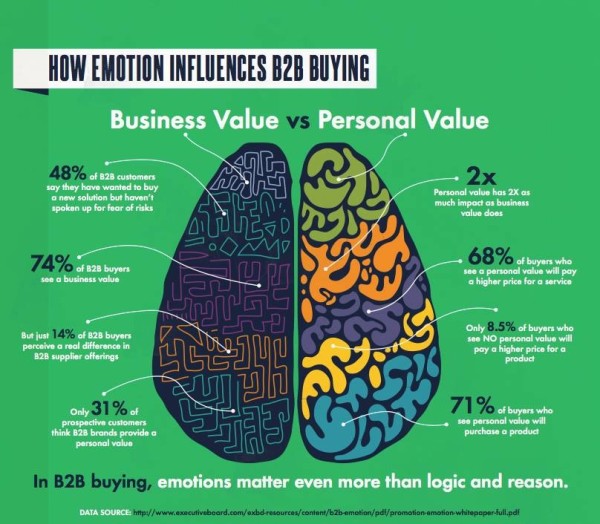If I were to tell you that the reasons why we buy things are based more on emotion than logic or reasoning you probably wouldn’t doubt me, would you?
I believe we all recognize this behavior, especially when it comes to personal purchases. It’s best expressed by the saying that we buy things we don’t need, with money we don’t have, to impress people who don’t care. While this doesn’t apply to everyone, many of us have likely experienced it at some point. So, what about B2B buying? Do personal feelings affect our business purchasing decisions? If they do, what should we understand to better position our brands?
A recent study by the CEB investigated how personal emotions affect B2B purchases and revealed that 71% of buyers who recognize personal value in a B2B purchase will ultimately make the purchase. In fact, personal value had twice the influence on buyers compared to business impact. In summary, the survey clearly showed that personal value, or emotional value, significantly surpassed logic and reason in influencing buying decisions.
The data in this study shouldn’t come as a surprise to anybody, but what it should do is come as an important reminder to people that the reasons that people buy are usually attached much closer to their emotional center than their rational thinking. And while buyers will often push hard for specifications, data sheets and statistics in order to help them justify a buying decision, more often than not these requests are really their way of telling you that they are not yet seeing the personal value in the product being sold to them.
When you boil it all down, ultimately corporate buyers are people and that is probably the most significant driver of this bleeding of personal emotion into the B2B purchase. No matter how much as individuals we try to put our “Company” hat on and tow the company line, we allow our personal feelings to enter the buyer’s journey and influence the way we make purchases.
For brands this means it is more important than ever to focus on telling a story that resonates with the buyer on a personal level. When brands connect to people that way their impact goes further and it is much more likely to lead to a sale.
So leave the spec sheets and the charts in your brief case and start refocusing your sales and marketing efforts on connecting with people on an emotional level. Apparently this is more than just a feeling, but a true reflection on the way people buy and consume goods and services.
